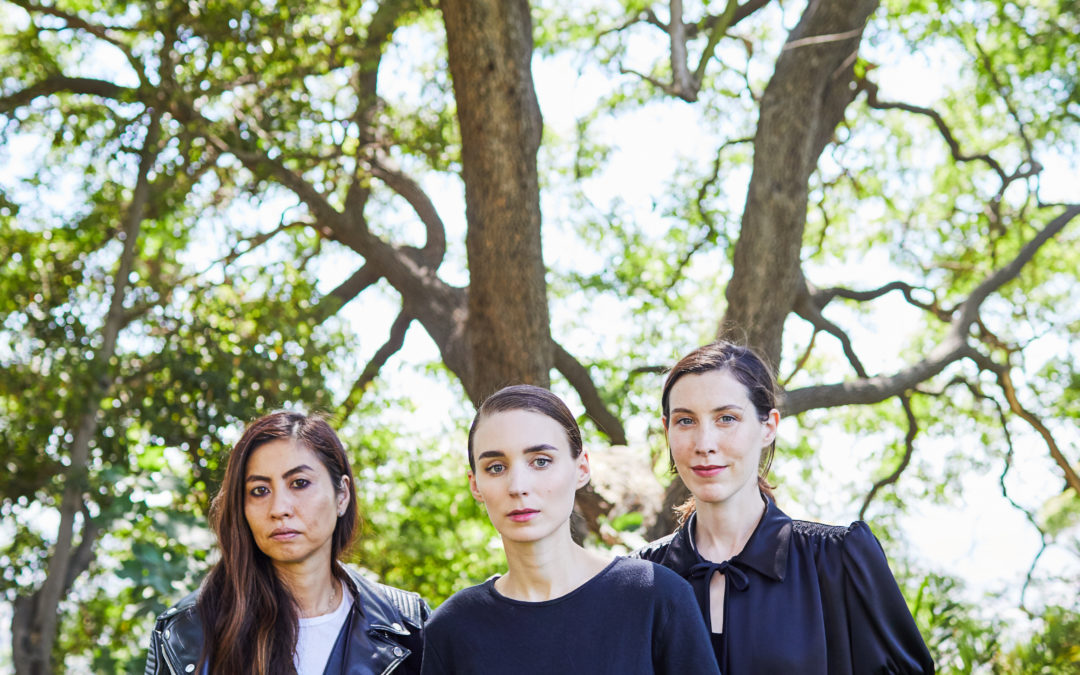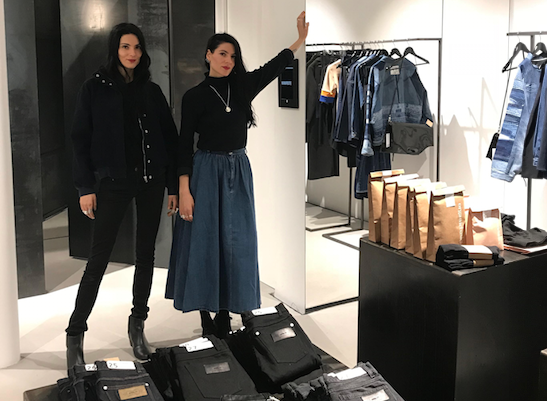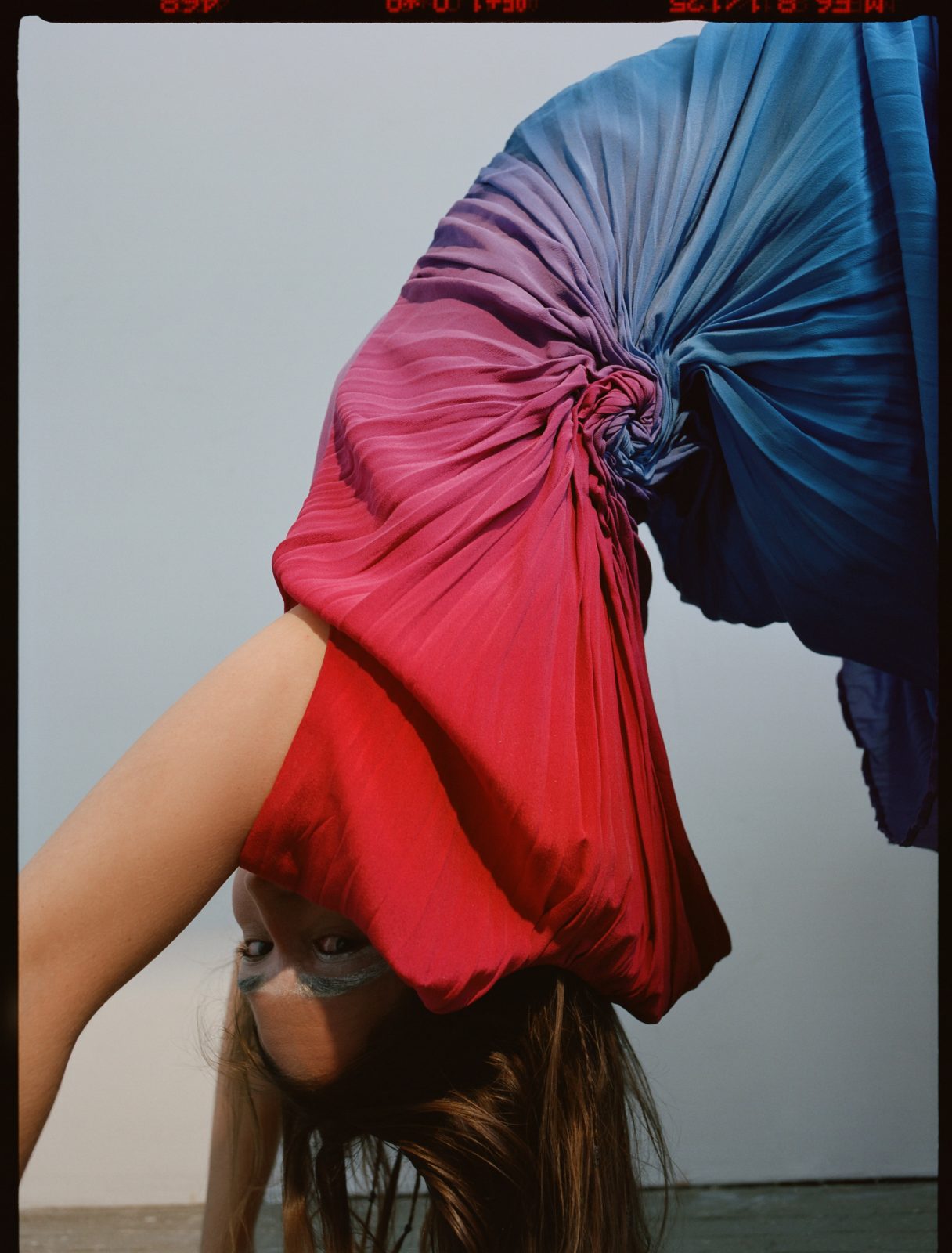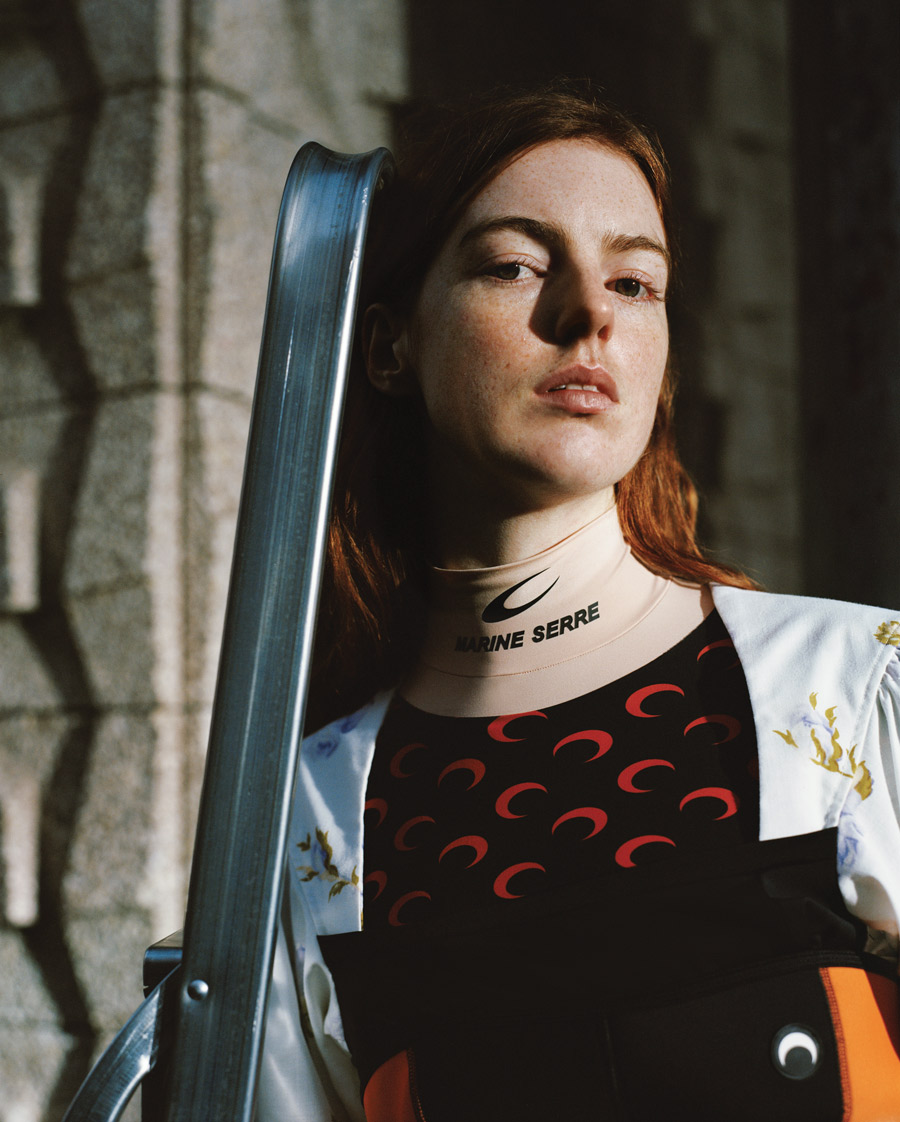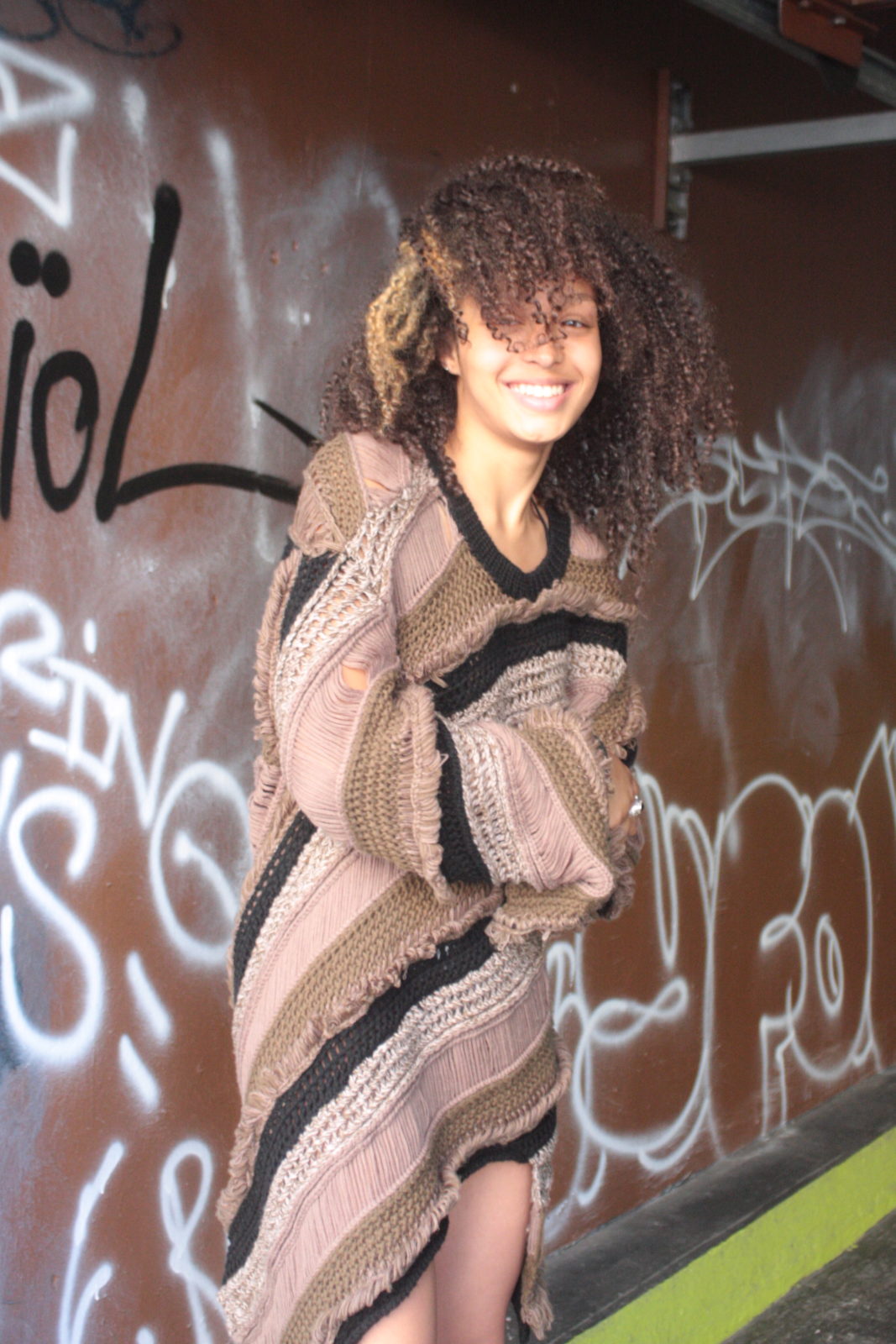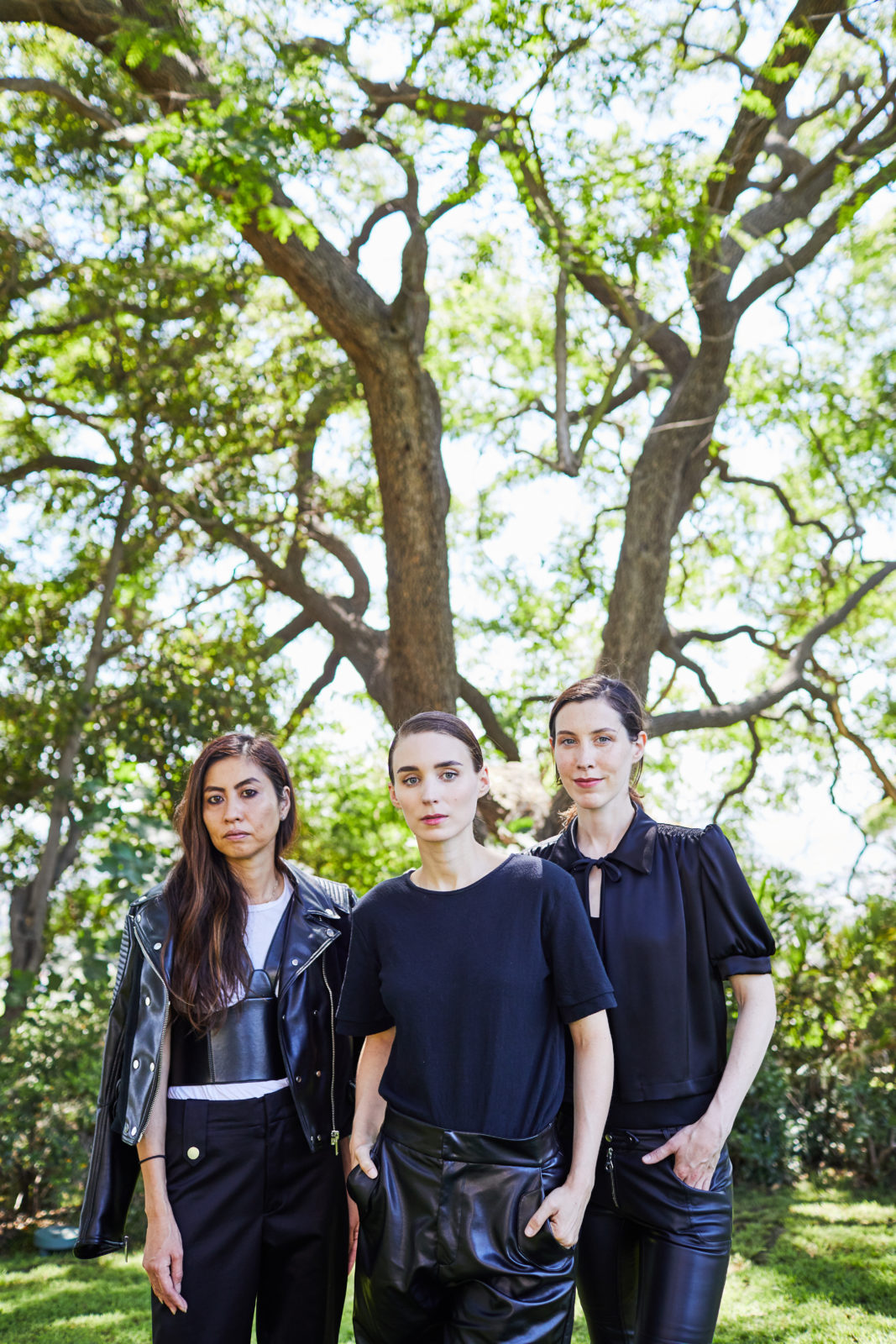
Chrys: Vegan leather jacket, Blaise moto leatherette harness bet, diamond basic tee, own trousers / Rooney: Petal sleeve tee, wide leg leatherette trousers / Sara: satin tie neck cardigan, leatherette moto leggings
A MEETING WITH HIRAETH
By Alice Butterlin
Rediscover our meeting with Rooney Mara and her Hiraeth partners from our issue 86.
An exceptional actress known for her roles in acclaimed films like Her, Carol, Millennium and A Ghost Story, Rooney Mara has always shown a rare gift for inhabiting complex, often dark characters. A longtime vegan, she recently decided to launch a conscience-driven project with her close friends and business partners Sara Schloat and Chrys Wong: a line of vegan ready-to-wear called Hiraeth. Guided by a new ethical way of living, she reflects on the negative impact of disposable fashion and the urgent need for ethical clothing. We recently chatted with Rooney Mara, the face of Givenchy’s new fragrance L’Interdit, and her two associates.
How did you all meet and initiate the project?
Rooney: I have known Sara since I was little, and I met Chrys a few years back. Sara and I had been talking about doing something for a while, so when I went vegan and decided to also eliminate animal products from my wardrobe and saw how few options there really were, it really came from my own need. Then we got Chrys involved and things went from there.
Sara: Rooney and I grew up together and have been friends all our lives. The impetus for the brand was Rooney’s idea. When she began to steer away from leather goods, we started talking about it more seriously.
Chrys: I met Rooney only a few years ago. I had always admired her unique sensibility. So when Rooney approached me with this project that she and Sara conceptualized, I was immediately interested and wanted to help in any way I could.
Where did your love of fashion stem from?
Sara: For me, my love of fashion came from my mom and from growing up with Rooney. We always shared a love of fashion and clothes, even from the time we were quite young. In fact, I can remember reading Vogue for the first time at Rooney’s house when we were kids.
Chrys: During the last year of college, I was taking summer courses in Paris where I met some very fashionable people and hung out at Colette every day. Someone suggested that I take a job at Maxfield, a high-end boutique in Los Angeles, when I returned home. My time at Maxfield coincided with the rise of Rick Owens and Nicolas Ghesquière at Balenciaga. It was an exhilarating time. I learned a lot, and I have been enthralled with fashion ever since.
The name Hiraeth seems like a pertinent choice to represent your brand, as this Welsh word translates to a certain sense of nostalgia in English. What are you nostalgic for?
Rooney: I think we are referring to a nostalgia for a sort of connection between people and the things that they consume. There is an overall lack of connection between humans these days—it’s funny because in a lot of ways we are more connected than ever. But it is no longer true in a genuine sense. Everything is so fast and so curated. People are especially disconnected from the food that they eat and the things that they buy: where those things came from, WHO they came from, who made them. How many humans’ or animals’ energy or lives or hard work are wrapped into the things that we buy and consume? I think there is a movement where people want to be more conscious about those things. But I definitely think that lack of connection leaves people feeling like they are missing something—something they can’t quite pin down.
Sara: I am nostalgic for a time that was simpler and not so technologically-driven.
Chrys: I am nostalgic of a time when everything was made well and made to last. Before assembly lines, an entire garment was often made by the same person from beginning to finish with pride. Aside from wearing Hiraeth, I still get some of my trousers made by old school tailors. There is so much seam allowance left for sizing up and down, I can potentially wear everything forever.
In a world of mass production and fast fashion, did you feel it was time to take a step back and promote real values?
Sara: The concept of Hiraeth, too, is that we, as consumers, have become very disconnected from how clothing is produced and sold. We want people to feel good about the clothes they are wearing and know the value behind it.
Chrys: Mass production and fast fashion democratized fashion, which is necessary and inevitable. But I think the values we are promoting ring a bell with lots of people.
Are you avid trend followers? What do you think of the current state of fashion, which seems so full of logomania and expensive sportswear?
Rooney: I don’t follow trends, no. I just like what I like—a lot of my favorite things I have had for years and years and wear them over and over again.
Sara: We are not particularly avid trend followers. We want to make clothing that is beautiful and on trend, but still classic and wearable for a long time.
Chrys: I educate myself about trends because it is part of my job. But most of the time it is the bigger ideas behind the trends that I am interested in. Fashion is entering new territories and emerging markets. Newcomers to fashion are often logo-driven and gravitate towards statement items that are influenced by pop culture. The pendulum will swing back as consumers become more aware of their options. I do believe simple, well-made clothing has the most staying power.
When did you become vegan and for what reasons?
Rooney: I have been vegetarian on and off since I was about 9. I’ve always loved animals and felt very connected to them. I went vegan about 7 years ago. Someone sent me an undercover video of a pig farm, and though I was already vegetarian it sent me down a YouTube rabbit hole of other videos and I have been vegan ever since. So I am an ethical vegan. But I also happen to feel better physically eating that way.
Sara: I am not vegan, but I try to be conscious and aware of where my food comes from, like whether it’s organic and sustainable. Folks should know that you do not need to be vegan to wear our clothing. We wanted to create another option for people—to know that no animals were harmed and that it’s produced by small factories in Los Angeles.
Chrys: I am not a vegan but more and more I have adopted more of a vegetarian diet for health reasons. I also feel more creative when I get to work with organic fruits and vegetables in the kitchen.
Was it hard to find good vegan clothing brands at the time?
Rooney: Well, there was always Stella! I love her stuff and she is such a pioneer. I think the hardest things to find are shoes and bags—it’s easy to find much cheaper items that are labeled “vegan”. But though those things are cruelty-free in terms of being animal-free—I don’t know where those things were made and at what price to whoever was making them.
Sara: There aren’t many vegan designers in general. Stella McCartney makes beautiful shoes and bags that are vegan, so that is really the standard for us.
Chrys: I used to shop exclusively at Barneys New York, and there is always Stella McCartney I can count on. I also liked a lot of the faux fur offerings from Dries van Noten. Generally, I do think there can be more brands that offer a larger assortment of animal-free products.
Why should people adopt a vegan lifestyle? Is it a way of life that is still misunderstood?
Rooney: I don’t like to really preach about this, or I TRY not to. Because what do I know? And who am I to tell people how to live their lives? I know what I believe, and I feel quite strongly about that belief for myself. But I’d rather just do my thing, and hope that rubs off on people. I guess the one thing I will say is that if you care about the environment, then cutting back on your consumption of animal products is essential. There used to be a time when eating meat and other animal products was a luxury, where buying leather was a luxury. We, as humans, have become so entitled and unaware of the toll that entitlement takes on the planet. The idea that we can have access to whatever we want, whenever we want it—the planet can’t sustain that. So, if you care about the environment, which I think most people do, then you should try and be more conscious of what you consume. I also understand that eating vegan and talking about some of these things is easy to do when you come from a place of privilege. And that for a lot of people just trying to get by, it’s not so easy. I think it’s more about doing what you can, where you can.
Sara: I am not vegan, but I certainly see the value in reducing how many animal products we consume for both ethical and environmental reasons. Leather and fur have long been « luxury » items, but we would like to offer a different perspective.
Chrys: It’s simply an appealing way to live. I am not dogmatic about it, but there are many attractive food and material products emerging in the market that I find exciting to discover.
In terms of aesthetics, what were your main inspirations while creating the brand?
Sara: Our aesthetic is a mix of romantic and modern. We drew inspiration from beautiful vintage pieces that are still relevant in today’s fashion landscape.
Did you get to visit the factories that produce your clothes? Why did you choose to produce everything in LA?
Sara: We chose to produce everything in LA because we are able to oversee and participate more in the production. We visit the factories and know the people who are creating the pieces. We love being a small brand and making our collection from local producers.
Chrys: We visit our factories regularly. That was one of the main considerations when we started the company. We like our production process to be transparent, and therefore our production is in LA, where Hiraeth is based.
How do you want the brand to evolve in the future?
Sara: We want the brand to evolve organically. We hope that people respond and enjoy the collection as much as we do and hopefully we can grow from there.
***
Photographer: Jared Zagha
Makeup: Kate Lee @ The Wall Group
Hair: Adir Abergel @ Starworks Group







